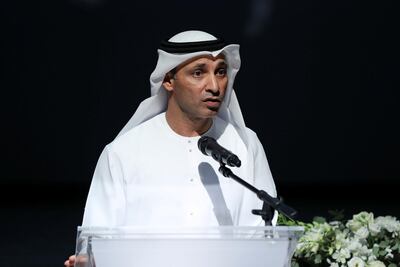Children could attend several schools at the same time as a shift to remote learning helps usher in a new flexible era of teaching, Dubai's private education chief said.
Dr Abdulla Al Karam, director general of the Knowledge and Human Development Authority, said parents would increasingly seek out tailored learning experiences to benefit their child's particular strengths.
The Covid-19 pandemic prompted a shift to distance learning, as pupils took part in lessons from their own homes rather than classrooms to limit the spread of the virus.
Even as the world recovers from the pandemic – with the rapid development of Covid-19 vaccines offering hope for the future – Dr Al Karam believes the education sector will not fully return to its traditional methods.
"There will be as many models of education as there are pupils," said Dr Al Karam, while delivering the keynote speech at the Education Investment Mena, an online conference in Dubai on Tuesday.

"The relationship between schools and pupils has traditionally been exclusive.
"Pupils can only go to one school, and schools can only teach their own pupils. That will change as more learning moves online."
Brick-and-mortar schools, however, would be more important than ever as community centres in the post-Covid world, Dr Al Karam said.
He said schools played a huge role in improving the well-being of individuals.
"When online learning can meet students’ academic needs, it will be the physical schools that meet the holistic needs of pupils that will really stand apart," he said.
The expert said that technology had transformed almost all sectors of the economy, but it took a pandemic to change the structure of education.
Dr Al Karam said Covid-19 has changed people's expectations of education.
In recent months, parents have been able to get a closer look at how their children learnt.
The education chief said schools that cost millions of dollars to build were only open for seven or eight hours in a day, and were closed in the evening, during the holidays and the summer break.
"The clever schools will be the ones that consider how they can use the changing dynamics to their advantage and the pupil’s advantage as they make their future plans," he said.
Ashwin Assomull, head of LEK Consulting's Global Education Practice, shared an update on the repercussions of the Covid-19 disruption on the sector during the conference.
He said the lockdowns in various countries had caused significant short-term disruption across private education sectors globally, with school operators facing challenges.
Mr Assomull forecast that the schools would not be adversely effected by the disruption in the long run.
“K-12 (primary and secondary education) schools are ‘good as gold’ – due to their attractive characteristics as business models and the lack of credible digital alternatives that can replace these institutions,” Mr Assomull said.
Data from the United Nations shows the pandemic affected nearly 1.6 billion learners in more than 190 countries, while closure of educational institutions affected 94 per cent of the world’s pupil population.
















